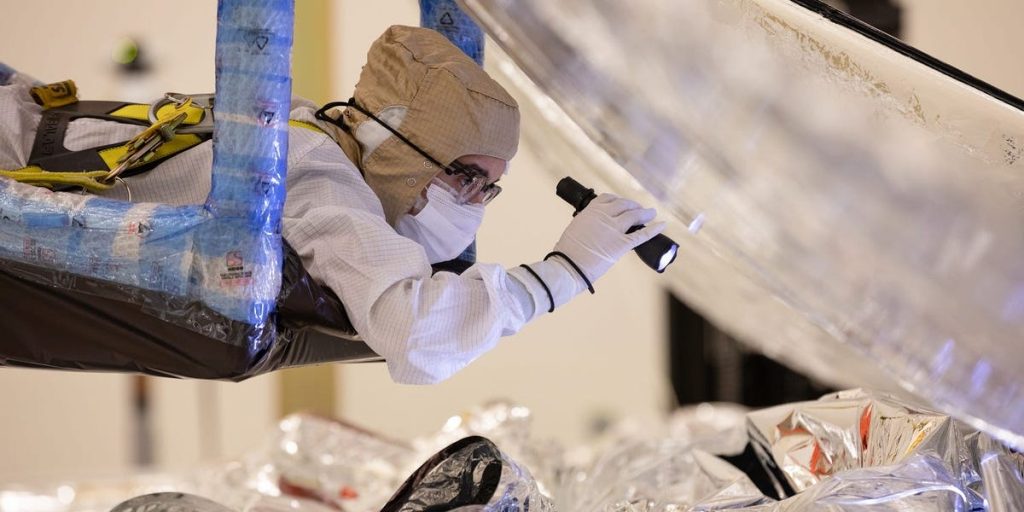This as-told-to essay is based on a conversation with Karen Abarca, a 33-year-old communications engineer in Los Angeles County. It’s been edited for length and clarity.
I am very fortunate to have not just one, but two highly sought-after careers.
My mom is a seamstress, so she taught me how to fix my clothes. Once she taught me how to make dresses in high school, it was game over. That’s all I wanted to do.
But as a kid, I loved science. I grew up thinking that I would be a scientist or maybe a doctor. I never really saw that path for me because I didn’t know anyone who worked in science.
In my early 20s, my family experienced some financial hardships. Since I had cultivated this skill of making garments, I ended up going to the Fashion Institute of Design Merchandising in Los Angeles and got connections to start working in the film industry.
Northrop Grumman
I ended up interning at Maker Studios, which later got bought out by Disney. They gave me stable work in the entertainment industry, which is kind of rare. I also would do commercials on weekends or just pick up gigs on the side. I did that for about four years.
I decided to pursue a career in science after staring at the stars
December is always a hard time in the costume design industry because everything shuts down, but I still have to pay rent. I remember visiting Death Valley with friends on New Year’s Eve and looking at he stars.
Related stories
I thought, “I sort of stumbled into this industry. It was something that I was good at, and I could help out my family, but I no longer have to do that. Why don’t I go back and do the thing that I wanted when I was a kid? I want to explore and discover.”
So, I went back to community college and later transferred to California State University, Long Beach, where I got my bachelor’s in chemical engineering in 2020.
It was not easy.
I had to learn how to fail and how to study. I got a D in my first Calculus II class, and it’s a very humbling experience to be told no and that you have to do it again. It was also challenging being older than everyone around me and giving up a career that I was doing well in.
But I knew that this was my choice. I had already seen a different industry, and it just gave me further motivation to keep going and see myself grow. I ended up becoming a mentor to many of my classmates.
I realized that my gift is to bring people together. I’m really good at working in teams, and little did I know that is what makes great engineers. I interviewed with and later joined Northrop Grumman, an aerospace company.
I had impostor syndrome at my first job. Then, I worked on NASA’s James Webb Space Telescope
Northrop Grumman
I definitely had a lot of impostor syndrome when I started at Northrop Grumman in 2020. I remember getting hired thinking, “They’re going to know that I don’t know.” I just felt overwhelmed.
At first, I worked with a small team, but it was only a four-month project, so after that, my manager was like, “Where do we put you?”
An opportunity had just opened up to work as a contamination control engineer on NASA’s James Webb Space Telescope. WEBB is a giant camera, so any contamination will affect the quality of the images. It’s a NASA program, so of course I wanted to do it.
Every day, I put on protective gear called a bunny suit and worked on that amazing gold-plated mirror. The cool thing about contamination control is that I got to actually touch WEBB, and not everybody gets to say that.
One day, I was cleaning a black, non-reflective, matte unit delivered from Italy. I had to be very delicate handling it, and I remember thinking, “What’s so special about this thing?”
I learned that the unit is how we’ll communicate with WEBB when it’s a million miles away. It’s how it’ll be able to send its images.
Northrop Grumman
I thought being able to talk to things in space was amazing, and that’s how I found my niche, which is communications engineering. Now, I work on a program called Hydrant. We’re looking to build the next-generation space router for interconnectivity in space.
I discovered what I really wanted to do
I’m really grateful to have been a part of that program because WEBB was my teacher. I didn’t know much about space when I started, but I got to see different disciplines through WEBB every day. WEBB just gave me an in-person view of what a spacecraft is and how to build one and the different subsystems.
My advice for people who want to change careers is that it’s never too late. There are definitely opportunities out there. Sometimes you have to make them, but align yourself with people who may be in those careers and try to find mentors. There’s also a benefit to being new to an industry. You bring a new perspective coming from a different background.
And if you don’t, you’ll always wonder, “What if?”


